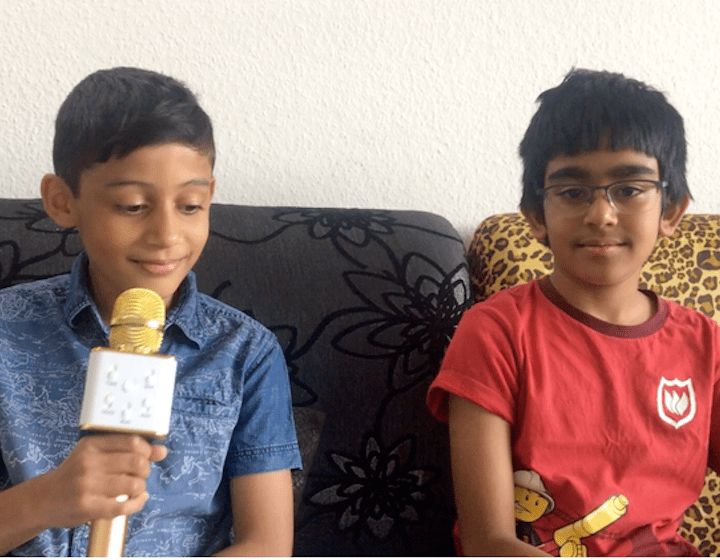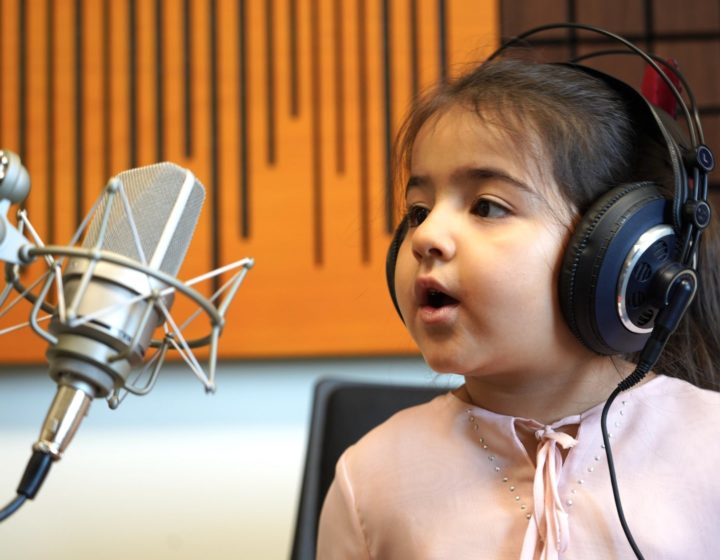
Six fun exercises that you can try with your kids to help them explore their voice and creativity to build their public speaking confidence
Whether you are making a presentation to your colleagues or addressing an audience on Clubhouse, public speaking requires you to prepare, memorize, think on your feet and use different techniques to keep the momentum going. Fear of public speaking is a common anxiety that many of us have encountered in our lives. But it is a skill that can be built over time so why not get kids started on learning how to speak to others with confidence early on? Apart from subject matter expertise, we need to articulate our thoughts and ideas in simple yet impactful ways to reach the right people. As a parent and as a public speaking teacher, I had wondered if there were ways to build public speaking confidence in our kids using simple practices at home. Through my experience, I realised that children enjoy expressing their ideas or thoughts but often do not get the right avenues to share them.
Here are six fun easy exercises that don’t require a lot of time but can help children explore their voice and creativity. The best part is once they get started, they feel encouraged and motivated to try bigger and bolder aspects of public speaking.
6 Exercises to help your kids be more confident at public speaking

1. Read out loud
Reading out loud is a great way to learn voice modulation, understand pauses and emphasis points, improve pronunciation and build confidence. To make it fun, try shuffling between news pieces, stories, speeches, and poetry. Another suggestion is to read a lively paragraph in a boring and dull voice in the first attempt and subsequently, read it with energy and enthusiasm to understand the contrast between the two tones/styles.
2. Record their reading
An easy way to boost your child’s interest in public speaking is to record them, it could be either a video recording or an audio recording depending on your child’s comfort level. These days, every phone is equipped with a voice recorder which makes it very easy to try this technique out. Recording allows the child to be aware of their style, body language, speed, accuracy, pronunciation and tone of voice. Later, you could have a dialogue about their strengths and weaknesses. This tool can also be used to observe the development in their confidence and skills over a period of time. Often, children (as well as adults) find it odd to listen to their own voice but the more you do it, the easier it gets. The first few times might seem awkward but the process gets refined as you go along.
3. Listen to kids presenting on programmes/podcasts
If you have watched Malala Yousafzai deliver her speech in the Canadian Parliament you might have been struck by the standing ovation she received on multiple occasions. I enjoy watching that video with my students and my own children, as it helps them relate to the young girl, who is sharing her story, in a room full of adults. Similarly, watching kid news-reporters on Scholastic media website and listening to podcasts that are co-hosted by kids such as ‘Brains On’, ‘Smash Boom Best’ among many others is a great way for your kids to learn new things and also get inspired by other children. Often these podcasts invite listeners to send in their mystery sounds, fun-facts, questions in the form of voice notes. That is a great way for kids to practice their skills and it is rewarding for them to hear themselves on a public platform that they enjoy listening to.

4. Practice what you preach
If your child enjoys a bedtime story, you could take that opportunity to bring to life the storyteller within you. Try to give different voices to different characters or add fun elements to your stories by making animal sounds or situational sounds (door creaking, stomping etc.). This would make your nighttime story sessions extra special and would help them understand how to embody the different characters. They might be motivated to copy your style. If you have older kids then you could modify this activity by enacting your favourite story/song.
5. Put it into writing
If your child has an activist streak then encourage them to write three points in favour of and against an argument (for example climate change). It will not just hone creative writing skills but also train kids in structuring stronger arguments. My child enjoys political commentary and during the U.S. election season he was imitating Trump’s style of speaking. Together we wrote and enacted a piece where he was delivering a speech in the former President’s style. Remember the key objective here is to have fun! Just give yourself permission to act silly and have some fun together. You will be surprised at the ideas kids come up with. In one of my classes, a student pretended to be a news reporter reporting from a site of volcanic eruption where instead of lava the volcano was spewing Nutella!

6. Record your own podcast
If you want to get a little bit more sophisticated, you can record your own parent-child podcast, which will allow you to publish your musings or share your expertise with the world. Audio has become a strong medium to relay our ideas and articulate our thoughts. Apps such as Anchor make it super-easy to record yourself. You can record, add music, edit, create and distribute your own podcast in a matter of minutes. The best part of this project is the confidence boost your child gets when they hear themself on the various platforms. I have been creating podcasts with my children and students for the last 9 months and it is heartwarming to see their growing confidence, not just in their style but also in the choice of topics that they want to share with the audience. In recent episodes, we have discussed autism, fast fashion and shared many stories. Podcasting is definitely a fun way to motivate children to try public speaking plus there is an added comfort of privacy given this is an audio medium.
Lastly, it is important to remember that not all children are open to the idea of sharing their opinions or standing up on stage and it might be a little bit harder for them to come around to speaking in front of others. Give kids space to get comfortable with the idea of reading out loud/speaking in front of others so that their first steps into the realm of public speaking are positive ones.
Good luck with practising these exercises – you are helping your child with an important life skill that they will thank you for later!






 View All
View All





 View All
View All









 View All
View All






![[𝗦𝗔𝗩𝗘 𝗧𝗛𝗜𝗦] 𝗞𝗶𝗱-𝗔𝗽𝗽𝗿𝗼𝘃𝗲𝗱 𝗗𝗲𝘀𝘀𝗲𝗿𝘁 𝗦𝗽𝗼𝘁𝘀 𝗬𝗼𝘂 𝗖𝗮𝗻 ‘𝗘𝗮𝘁 𝗳𝗼𝗿 𝗙𝗿𝗲𝗲’ 𝗪𝗶𝘁𝗵 𝗖𝗗𝗖 𝗩𝗼𝘂𝗰𝗵𝗲𝗿𝘀! 🍦🍩🧁😉
Before you ask “Can use CDC voucher?” Yes, you definitely can! These spots are perfect for an after-school treat, weekend fun, or just saying “yes” to dessert without saying goodbye to your wallet.
Comment “Sweet” or tap the link in bio for more foodie recommendations!
Got a fave kid-friendly spot that accepts CDC vouchers? Let us know in the comments too!
.
.
.
.
.
.
.
#CDCVouchersSG #SGMumLife #KidFriendlySG #FreeDessert #HeartlandEats #SweetTreatsSG #SGParents #FamilyFunSG #WafflesAndIceCream #BudgetParenting #ThingsToDoWithKidsSG #SGCafes #SupportLocalSG #KidsEatHappy #CDCAdventures](https://www.sassymamasg.com/wp-content/plugins/instagram-feed/img/placeholder.png)
